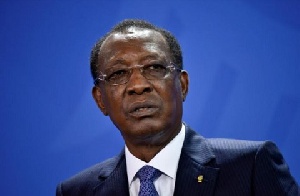Chad's President Idriss Deby Itno has died on the battlefield after three decades in power, the army announced on state television on Tuesday.
The stunning announcement came just hours after electoral officials had declared Deby, 68, the winner of the April 11 presidential election, paving the way for him to stay in power for six more years.
Deby "has just breathed his last defending the sovereign nation on the battlefield" over the weekend, army spokesman General Azem Bermandoa Agouna said in a statement read out on state television.
Deby's campaign said on Monday that he was headed to the frontlines to join troops battling "terrorists".
The circumstances of Deby’s death could not immediately be independently confirmed due to the remote location. It was not known why the president would have visited the area or participated in ongoing clashes with the rebels who opposed his rule.
Rebels based across the northern frontier in Libya attacked a border post on election day and then advanced hundreds of kilometres south across the desert.
One of Africa’s longest-serving leaders
Deby came to power in a rebellion in 1990 and is one of Africa's longest-serving leaders.
Although ruling Chad with an iron fist, he was a key ally in the West’s anti-jihadist campaign in the troubled Sahel region.
The army said a military council led by the late president’s 37-year-old son Mahamat Idriss Deby Itno, a four-star general, would replace him.
On Monday, the army had claimed a “great victory” in its battle against the rebels from neighbouring Libya, saying it had killed 300 fighters, with the loss of five soldiers in its own ranks during eight days of combat.
Herder’s son
He was a herder’s son from the Zaghawa ethnic group who took the classic path to power through the army, and relished the military culture.
His latest election victory – with almost 80 percent of the vote – had never been in doubt, with a divided opposition, boycott calls, and a campaign in which demonstrations were banned or dispersed.
Deby had campaigned on a promise of bringing peace and security to the region, but his pledges were undermined by the rebel incursion.
The government had sought Monday to assure concerned residents that the offensive was over.
There had been panic in some areas of N’Djamena on Monday after tanks were deployed along the city’s main roads, an AFP journalist reported.
The tanks were later withdrawn apart from a perimeter around the president’s office, which is under heavy security during normal times.
“The establishment of a security deployment in certain areas of the capital seems to have been misunderstood,” government spokesman Cherif Mahamat Zene had said on Twitter on Monday.
“There is no particular threat to fear.”
However, the US embassy in N’Djamena had on Saturday ordered non-essential personnel to leave the country, warning of possible violence in the capital. Britain also urged its nationals to leave.
France’s embassy said in an advisory to its nationals in Chad that the deployment was a precaution and there was no specific threat to the capital.
Libyan-based rebel group
The rebel raid in the provinces of Tibesti and Kanem was carried out by the Front for Change and Concord in Chad (FACT), based in Libya.
The group has a non-aggression pact with Khalifa Haftar, a military strongman who controls much of Libya’s east.
FACT, a group mainly made up of the Saharan Goran people, said in a statement Sunday that it had “liberated” the Kanem region. Such claims in remote desert combat zones are difficult to verify.
The Tibesti mountains near the Libyan frontier frequently see fighting between rebels and the army, as well as in the northeast bordering Sudan. French air strikes were needed to stop an incursion there in February 2019.
In February 2008, a rebel assault reached the gates of the presidential palace before being pushed back with French backing.
Africa News of Tuesday, 20 April 2021
Source: france24.com













